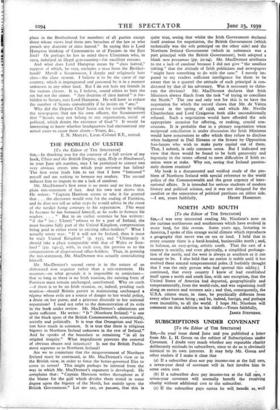THE PROBLEM OF ULSTER [To the Editor of THE SPECTATOR]
Sra,—In thanking you for the courtesy of a full review of my book, Ulster and the British Empire, 1939, Help or Hindrance?, in your June 9th number, may I be permitted to correct two very obvious errors into which your reviewer has fallen? The first error leads him to say that I have " bemused " myself and am seeking to bemuse my readers. The second induces him to impute to me a lack of candour.
Mr. MacDermot's first error is no more and no less than a plain mis-statement of fact. And his own text shows this. He writes: " Captain Harrison seems to take it for granted that . . . the electorate would vote for the ending of Partition, and he does not tell us what steps he would advise in the event of the verdict being contrary to his expectation. This must be because he has bemused himself, as he seeks to bemuse his readers. . . . " But in an earlier sentence he has written: " if she " (sc.: Ulster)" refuses to be a part of Ireland, she must become fully part of the United Kingdom, compensation being paid in either event to existing office-holders." What I actually wrote was : " If it will not be Ireland, then it must be truly United Kingdom " (p. 155), and " Ultimately it should take a place comparable with that of Wales or Scot- land " (pp. 141-2), with, in each case, the proviso as to the compensation of dispossessed office-holders. Thus, in penning the mis-statement, Mr. MacDermot was actually contradicting himself.
Mr. MacDermot's second error is in the nature of an
elaborated non sequitur rather than a mis-statement. He assumes—on what grounds it is impossible to conjecture— that so long as there is no Irish reunion, the existing form of Partition must remain unchanged, unreformed. Why on earth —if there is to be no Irish reunion, or, indeed, pending such reunion—should Britain persist in maintaining unchanged a regime whose evils are a source of danger to her world policy, a drain on her purse, and a grievous discredit to her national reputation? I need not refer to the demonstration of its evils in the book under review. Mr. MacDermot's admissions are quite sufficient. He writes : " It " (Northern Ireland) " is one of the black spots of the British Commonwealth, economically, socially and politically. It is true that Orangeism and Nazi- ism have much in common. It is true that there is religious bigotry in Northern Ireland unknown in the rest of Ireland." And he speaks of the boundary as remaining " in all its original iniquity." What impediment prevents the removal of obvious abuses and injustices? Is not the British Parlia- ment supreme as to Northern Ireland?
Are we to conjecture that the misgovernment of Northern
Ireland must be continued, in Mr. MacDermot's view or in the British view, in order to force the better-governed Eire to come to terms? This might perhaps be inferred from the way in which Mr. MacDermot's argument is developed. He complains that: " Captain Harrison writes throughout as if the blame for the gulf which divides them rested in some degree upon the bigotry of the North, but mainly upon the British Government." Let me say, en passant, that this is quite true, seeing that whilst the Irish Government declared itself anxious for negotiation, the British Government (which technically was the sole principal on the other side) and the Northern Ireland Government (which in substance was a part principal with the British Government), both adopted a blank non possumus (pp. 20-24). Mr. MacDermot attributes to me a lack of candour because I did not give " the smallest inkling " that the attitude of Irish politicians and newspapers " might have something to do with the case." I merely im- puted to my readers sufficient intelligence for them to be aware that in a quarrel the attitude of each principal is con- ditioned by that, of his adversary. Was it necessary to elabo-
rate the obvious? Mr. MacDermot declares that Irish Ministers always flinch from the task " of trying to conciliate the North." The one and only test for this is to have the negotiation for which the record shows that Mr. de Valera pressed in the spring of 1938, and which Mr. Neville Chamberlain and Lord Craigavon both alike unconditionally refused. Such a negotiation would have afforded the sole appropriate occasion for offering, or making, crucial con- cessions. It is probable that in a plenary negotiation when reciprocal conciliation is under discussion the Irish Ministers would have concessions to offer which they refuse to disclose when badgered in Dail Eireann or the Senate by Opposition free-lances who wish to make party capital out of them. That, I submit, is only common sense. But I indicated my view that there would be found to be both generosity and ingenuity in the terms offered to meet difficulties if Irish re- union were at stake. Why not, seeing that Ireland passion- ately desires reunion?
My book is a documented and verified study of the pro- blem of Northern Ireland with special reference to the world policy of the Commonwealth and the great urgency of inter- national affairs. It is intended for serious students of modern history and political science, and it was not designed for the comfort or the annoyance of political partisans on either side.










































 Previous page
Previous page